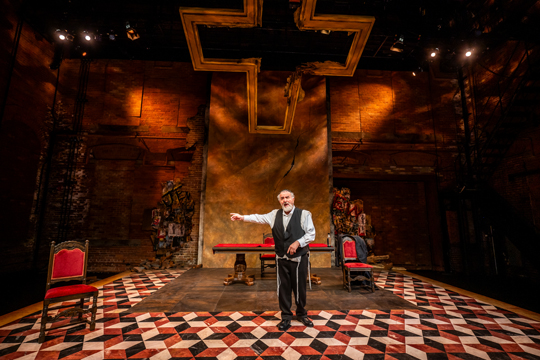By Alix Cohen
Between Acts I and II of Shakespeare’s The Merchant of Venice the production is shut down by protesters. Saul Rubinek, as a version of himself playing Shylock, refuses to go gentle into that good night and instead rages*…to us.
The Bard’s play: As a last resort, Venetian merchant Antonio borrows money from Jewish moneylender Shylock to help his friend woo a wealthy heiress. Legally permitted to lend, tolerated economically, the usurer is subject to intense discrimination. Sure his ships will (literally) come in, Antonio agrees to a pound of his own flesh as collateral. Up to this point, Antonio had publicly insulted, spit on, and undermined the moneylender’s business. When he can’t repay the loan, Shylock calls it in. Things don’t go well for him.
A success in Shakespeare’s time, the play, Rubinek suggests, “cashes in on” Christopher Marlowe’s The Jew of Malta, a revenge tragedy about greed, betrayal, and religious hypocrisy, centered on a wealthy Jewish merchant. “Marlowe’s Jew makes Shylock look like Seth Rogan,” he comments wryly.
Jewish responses to the character have ranged from deep discomfort and condemnation to complex reclamation and reinterpretation. Shylock is widely seen as a symbol of anti-Semitic stereotyping, but also as a vehicle for exploring Jewish suffering, dignity, and resistance.
There’s no fourth wall. Rubinek cites iconic theater command, ‘the show must go on.’ “Not this show, not this production…if you checked your phones at intermission…” he says referring to news broadcasts. “When was the last time a show was shut down midway in New York? Mae West in the 1920s, The Cradle will Rock in 1937…” He’s conversational, colloquial, even responding to a squeaking floor tile.
Theater and actor (ostensibly) did everything possible to adhere to moral and ethical responsibility. “I agreed to trotting out my Semitic credentials…in fact, the international Jewish community meets bimonthly to discuss…” Rubinek quips. “A rabbi or two was invited for talkback…Is there any other play that requires ritual apology?”
He spoke with a local community center and went on NPR. “How can you do this nasty play?” an interviewer asked. “I’m there to make nice and sell the piece, so I don’t say, why don’t you wipe that Jewier-than-thou look off your face,” he relates.
Playwright Mark Leiren-Young worked closely with the actor, telling Rubinek’s own story. Born to Holocaust survivors in a German post WWII refugee camp where his father ran a Yiddish repertory theater company, so-called orthodox “credentials” are impeccable. The Rubineks immigrated to Canada when Saul was 9 months old. Later, “I took my parents back to Poland to thank the farmers that hid them.”

“I think I was born to play Shylock because my father never got the chance.” Nothing else, the actor tells us, would tempt him back onstage at his age. (77) “I haven’t done theater in more than 40 years…It’s a play with a lotta lines and I don’t remember what I had for lunch.” (Rubenik has had a long career in film and television.)
The role made actors’ reputations for 400 years, Edmund Kean, Henry Irving, and John Gielgud among them. “You know, you don’t choose this life, it chooses you.” Colorblind casting he suggests, might have Black, Indigenous, or even Palestinian actors playing Shylock, but a Jewish actor apparently signifies betrayal. “We used to contain multitudes, now we’re told to stay in our lane.”
Critics like playwright Edward Einhorn and comedian Sarah Silverman have called for “authentic Jewish casting,” especially where Jewishness is integral to the character’s experience. The tern “Jewface”, popularized by Silverman,critiques non-Jews playing Jews as overt caricatures. Bad Yiddish and poor accents contribute. Part of its viewing audience objected to The Marvelous Mrs. Maisel which hardly bears the weight of Shakespeare’s character.
Raised in the religion Einhorn and Silverman say, actors bring a deeper understanding of historical and spiritual significance behind roles like Shylock. The truism might apply to gay people in gay roles. Would the eponymous Corleones (The Godfather) need proof of heritage if cast today? Do we assume all Italians are gangsters?
Every ethnicity and religion has been portrayed negatively. There will always be dissent. History and the rise of anti-Semitism make Jewish people particularly sensitive. I was surprised that my liberal, 103 year-old mother criticized Shylock’s depiction.
“Acting is appropriation. Acting who you are not is how we show our common humanity,” Rubinek says. So- is it a matter of ethical storytelling or credibility?
The bespoke one man play blends memoir, cultural critique and dramatic reflection spotlighting timely issues. It’s important as well as entertaining. Lively conversation is likely to follow.
I admit to thinking of Rubinek (merely) as a veteran character actor. He’s clearly capable of astonishing performance- nuanced, impassioned, furious, warm and witty. We believe him throughout. One rarely sees this level of connection to an audience. Intermittent speeches as Shylock are wrenching.
Martin Kinch’s direction is marvelous. We immediately forget the aborted production of Shakespeare’s play is not real. Staging is varied and naturalistic; pacing reflects real-time thinking and reacting. Removal of costume payot (long curled sideburns) at one point is aptly shocking.
Costume and Set Design (Shawn Kerwin) are apt and evocative. A giant cross hanging horizontally below the ceiling is inspired.
Sound Design (Olivia Wheeler), faint music when the actor inhabits Shylock- is insidiously atmospheric
• Dylan Thomas- “Do Not Go Gentle Into That Good Night”
Photos by Dahlia Katz
Playing Shylock –Who Gets To Tell the Story
By Mark Leiren-Young
Directed by Martin Kinch
Through December 7, 2025
Polonsky Shakespeare Center
262 Ashland Place, Brooklyn (steps from BAM)
https://tfana.org/about/polonsky-shakespeare-center


